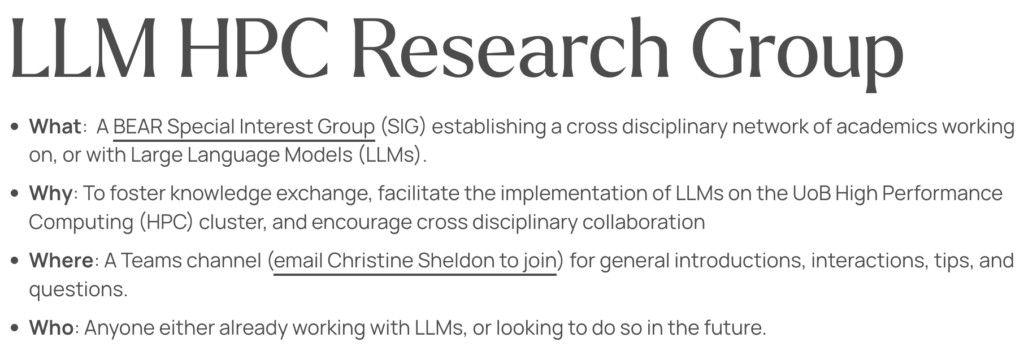Birmingham Environment for Academic Research (BEAR) Newsletter
September is the month for RSECon and this year, several of our Research Software Engineers (RSE) headed to Newcastle, where Gavin Yearwood and James Tyrrell led a successful lunchtime meeting of RSE’s involved in their own regional subgroups, with a large number of our local RSE Midlands members attending. Data-related events and training are starting up again after the summer, and we feature some in this month’s newsletter.
Included in this month’s BEAR newsletter:
- News from the Advanced Research Computing team
- Interdisciplinary Data Science Digital Research Conversation
- Funding opportunity for interdisciplinary UoB researchers interested in using AI or Data Science
- New Special Interest Group for Large Language Models
- Training in research computing
- ARCHER2 training at the University
- ReproducibiliTEA Journal Club – appeal for co-runners
- CIUK 2024 opportunities for participation
- UK Data Service training workshops
- Case study on using BlueBEAR to study stars across the Milky Way
- BEAR drop-in sessions
News from the Advanced Research Computing team

The Research Software Engineering (RSE) Service within Advanced Research Computing is continuing to expand. We are excited to announce the appointment of Dr Adrian Dante Garcia as our new RSE Service Lead. Adrian will work with ARC’s leadership team to continue to develop this popular offering. The RSE Service has recruited two new RSEs during August and is looking forward to introducing them to the community shortly. We will also be announcing further new posts in the coming weeks.
Interdisciplinary Data Science Digital Research Conversation

On Friday 29 November (between 12.00-14.00pm), Advanced Research Computing (ARC) and the Institute for Interdisciplinary Data Science and AI (IIDSAI) present Interdisciplinary Data Science: Strategies for Success – a lunchtime discussion event, which is part of ARC’s Digital Research Conversations series. The event will include lunch and features UoB researchers discussing the benefits, challenges and strategies for success in interdisciplinary research. Check the IIDSAI Teams channel for the upcoming event programme and details and future BEAR newsletters.
Funding opportunity for interdisciplinary UoB researchers interested in using AI or Data Science

For researchers exploring new boundaries in their field, with a project idea using data science or AI, the Institute for Interdisciplinary Data Science and AI (IIDSAI) is offering priming funds for high-impact, innovative projects to University research staff across all colleges and fields. The funding aims to support work that will lead to the future external funding of innovative, high-impact research and long-term research collaborations. We especially encourage researchers from underrepresented groups to apply, unique perspectives are vital to inclusive research, and IIDSAI is committed to enabling researchers to innovate.
The total funding available is £100,000, with ~£5-20,000 available per application. If your project would benefit, you can include paid time of one of our Research Data Scientists with part of the funding. Further details are available via the funding call webpage (closing date Friday 1 November).
New Special Interest Group for Large Language Models

Anyone who is already working with Large Language Models (LLMs) or looking to do so in the future is invited to join the newly formed LLM HPC Research Group. Led by Christine Sheldon (School of Government), the group aims to foster knowledge exchange, facilitate the implementation of LLMs on the University’s High Performance Computing cluster (BlueBEAR), and encourage cross disciplinary collaboration. For more information and joining instructions see the LLM HPC Research Group webpage.
Training in research computing

We have scheduled a series of courses for the autumn term, including Python, R, Image Processing with Python, Introductions to Linux and BlueBEAR, and NVIDIA Fundamentals of Deep Learning. For more information and to sign up, see our training webpages.
ARCHER2 training at the University

Running over two days in late November (date TBC), the team from ARCHER2 (the UK National Supercomputing Service), will be delivering a FREE in-person course at the University of Birmingham on Message Passing Interface (MPI). Booking will open shortly, for more information please visit the ARCHER2 website.
ReproducibiliTEA Journal Club – appeal for co-runners

The University ReproducibiliTEA Journal Club is currently looking for PGRs and ECRs who are interested in open science and research integrity to join as co-runners. ReproducibiliTEA is an initiative that has journal clubs at universities across the world with the aim of promoting reproducible research. We’re currently looking for 1/2 co-runner(s) who can join our existing 2 co-runners to help organise meetings once or twice a term (usually in-person). The Journal club is currently based in CMH (see CMH ECR pages), however we would be delighted to have co-runners from any college at the University – if interested, get in touch with Vicky Lyon (CMH Research Integrity Officer) at v.lyon@bham.ac.uk
CIUK 2024 opportunities for participation

Computing Insight UK (CIUK) is due to run in Manchester on 5-6 December. The theme for this year’s Conference is ‘Catalysing Research’ and there will be an exhibition showcasing the latest hardware and software releases, plus two days of presentations and breakout sessions. Applications are currently being accepted for a student poster competition (deadline Sunday 27 October), with selected poster presenters receiving free access to the Conference.
Applications are also being accepted from supervisors of Early Career Researchers for the Jacky Pallas Memorial Award – an opportunity for them to get a talk slot in the main programme at CIUK (deadline Friday 25 October).
UK Data Service training workshops

The UK Data Service offers free online workshops to assist researchers working with qualitative data. Upcoming workshops this autumn include ‘How to become a computational social scientist’ and ‘Ethical and legal guidelines in data sharing’. More information and booking details can be found on the UK Data Service training webpages.
Case study on using BlueBEAR to study stars across the Milky Way

In this month’s featured case study, Amalie Stokholm (Research Fellow in Physics and Astronomy) explains how she has been using stars to gain insights into the history of our Galaxy, using our supercomputer BlueBEAR. Amalie simulates and models thousands of stars using a Bayesian framework, which requires significant storage space and computational power, made possible through the provision of BlueBEAR and the Research Data Store. Have a read of Amalie’s case study to find out more.
BEAR drop-in sessions

We have both virtual and in-person drop-in session dates over September and October– check the drop-in webpage for updates, as well as details on how to join the virtual sessions. Currently scheduled dates are also listed below:
- Via Zoom – Thursday 26 September, 13.30-14.30pm
- Via Zoom – Wednesday 2 October, 12.00-13.00pm
- Via Zoom – Tuesday 8 October, 11.00am-12.00pm
- In-person – Thursday 17 October, 12.00-14.00pm – Staff Benefits Fayre, Great Hall (R6), Aston Webb
- Via Zoom – Friday 18 October, 11.00am-12.00pm
- In-person – Wednesday 23 October, 12.30-13.30pm – Murray Learning Centre (R28) Foyer
Missed last month’s newsletter?
Find July’s newsletter here. Sign up to receive the newsletter direct to your inbox by joining our bear-updates mailing list here (UoB login required), or ask to join via email at bearinfo@contacts.bham.ac.uk
